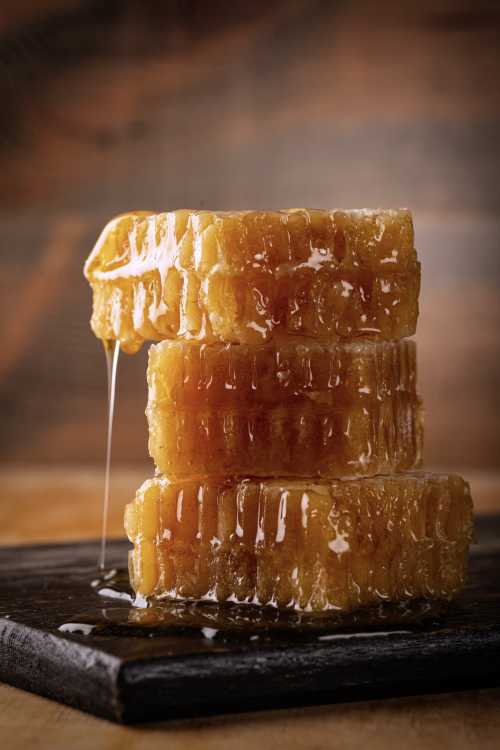Does Honey Contain Protein?
There is much interest in the nutritional value of honey, and some interest in whether honey contains protein.
Indeed, honey mostly comprises sugars, but it does contain a very tiny amount of protein. However, these miniscule amounts are inconsequential within the context of the human diet.
Therefore, anyone seeking to increase the protein content of their diet will not gain substantial benefit by consuming honey.
How much protein does honey contain?
At the time of writing this article, according to data from the USDA1, 100 grams of honey contains 0.3 grams of protein. This is a negligible amount of protein.
| Protein Content In Honey | |||
|---|---|---|---|
| Portion | Protein Content (Grams) | ||
| 1 tbsp (21g) | 0.063g | ||
| 100g | 0.3g | ||
Where does the protein in honey come from?
The protein in honey ultimately originates from the traces of pollen in the flower nectar used to make the honey2. The study of pollens in honey is called melissopalynology.
In addition, proteins are secreted from the salivary and hypopharyngeal glands of the bees themselves, and especially the major royal jelly proteins (MRJPs) from the hypopharyngeal glands2.
It is interesting to note that the proteins present in honey (including the MRJPs) are widely used as markers of honey authenticity2,3.
Protein in honey within the context of the human diet
According to the British Nutrition Foundation, the Reference Nutrient Intake (RNI) for protein for adults is 0.75g protein per kg body weight per day4.
Thus, they state the recommended protein for a person weighing 75kg would be 56g per day. Recommended protein intake for a person weighing 60kg would be 45 grams.
Obviously then, the only way to gain a reasonable quantity of protein from honey, would be to eat a lot of it.
In fact, put into the context of the human diet, a person weighing 75kg would need to eat 18,666g of honey, and a 60kg person would need to eat 15,000g of honey to reach the daily amount!
Given that honey is also very high in calories, this would of course be very unwise.
The importance of protein for bees
Protein is nutritionally important for bees, and is primarily obtained via flower pollen.
Is the protein content of every jar of honey identical? Does raw honey contain more protein than filtered honey?
Honey is a natural product. It is known that flowers vary in the amount of pollen reward offered to bees.
Thus, the protein content in honey will vary marginally, depending on floral resources used in making the honey, and perhaps very slight differences between honey bee colonies in characteristics of the bees themselves.
Raw, unfiltered honey is likely to contain more protein in it than filtered honey. The filtration process is likely to remove some of the protein contained in pollen.

References
1. Data from the USDA
2. Bocian A, Buczkowicz J, Jaromin M, Hus KK, Legáth J. An Effective Method of Isolating Honey Proteins. Molecules. 2019 Jun 29;24(13):2399. doi: 10.3390/molecules24132399. PMID: 31261846; PMCID: PMC6651845.
3. Bilikova K, Kristof Krakova T, Yamaguchi K, Yamaguchi Y. Major royal jelly proteins as markers of authenticity and quality of honey. Arh Hig Rada Toksikol. 2015 Dec;66(4):259-67. doi: 10.1515/aiht-2015-66-2653. PMID: 26751857.
4.The science of protein, www.nutrition.org.uk.
What's the real difference?
If you found this page helpful or interesting, I'd really be grateful if you would share it with others - if not this page, perhaps another, such as Gardening For Bees.
Thank you so much :) .